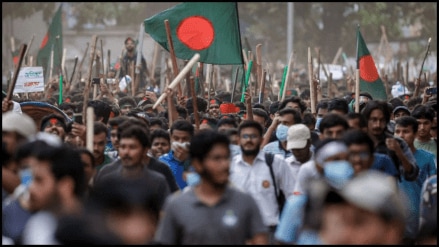In response to the escalating situation in Bangladesh, the Indian government has issued an advisory for Indian nationals and students residing in the country. The advisory urges them to avoid travel and minimize their movement outside their living premises to ensure their safety amid ongoing violent protests.
What is Happening in Bangladesh?
Bangladesh is witnessing widespread student protests against a recent court decision to reinstate a 30 percent government job quota for families of war veterans. The demonstrations, ongoing for weeks, have turned violent, resulting in at least five deaths and hundreds of injuries. Consequently, the government has shut down public and private universities indefinitely.
Background of the Protests
The protests began on July 1, 2024, following a High Court ruling to reinstate the job quota for descendants of those who fought in Bangladesh’s 1971 war of independence. Thousands of students from both government and private universities are demonstrating against the quotas, fearing that these reservations will limit their job opportunities. While the protesters support reservations for marginalized groups like women, ethnic minorities, and the disabled, they demand the elimination of the quota for war veterans’ families.
Reasons Behind the Protests
Protesters argue that the quota is discriminatory and should be replaced with a merit-based system. They also question the accuracy of the list of veteran families, suspecting that some might unfairly benefit from the provision. Additionally, they believe that the quota system favours supporters of Prime Minister Sheikh Hasina, whose Awami League party led the independence movement.
This quota system was initially abolished in 2018 by Prime Minister Hasina following widespread protests. However, the June 5 court order declaring the abolition illegal has reignited the anger among the youth.
Impact of the Protests
Government jobs in Bangladesh are highly coveted due to their attractive pay and benefits. With more than half of these positions reserved for certain groups, the reinstated quota has intensified the competition and frustration among students.
Escalation of Violence
The protests have turned violent, particularly at Jahangir Nagar University at Savar outside Dhaka. On July 15, police fired tear gas and used batons to disperse demonstrators during clashes between a pro-government student body and protesters. The violence has spread to other universities, leading to the indefinite closure of campuses.
Prime Minister Hasina’s remarks during a press conference, where she questioned the legitimacy of the protesters’ demands and referred to them as “Razakars” (a derogatory term for collaborators with the Pakistani military during the 1971 Liberation War), further inflamed the situation. Her comments were perceived as demeaning by the student protesters, intensifying their anger.
Government and Opposition Responses
The government has deployed riot police on campuses and paramilitary troops in several districts to control the unrest. Despite these measures, the protests continue to escalate.
Prime Minister Hasina and other government officials have criticized the protesters, accusing them of disregarding the country’s history and disrespecting the legacy of the 1971 Liberation War. Bangladesh Home Minister Asaduzzaman Khan requested students to refrain from blocking streets and return to their institutions, emphasizing that their actions were crossing limits.
Political Dimensions
The protests have also taken on a political dimension, with the main opposition party, the Bangladesh Nationalist Party (BNP), and its student wing supporting the anti-quota movement. The BNP has called for marches to protest the government’s heavy-handed response to the student protests.
Future Implications
Experts warn that the government’s failure to address the grievances of the protesters and its heavy-handed response could lead to increased instability in the country. The situation remains volatile, with the potential for further violence and unrest if a resolution is not reached.
Indian Advisory
In light of these developments, the Indian government has advised Indian nationals and students in Bangladesh to stay indoors and avoid unnecessary travel. The advisory aims to ensure the safety of the Indian community amid the ongoing turmoil.
As the situation continues to unfold, both the Indian and Bangladeshi governments will need to navigate the complex socio-political landscape to restore peace and stability.
